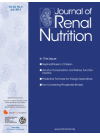"Higher renal net acid, but not higher phosphate excretion during growth associates with lower adult circulating uromodulin"
Uromodulin is the most abundant urinary protein in healthy subjects which under physiological conditions protects against kidney stone formation. Acid-base imbalances, especially states with acidic urine, increase the risk for uric acid and oxalate stones, but lower it for phosphate-containing stones. Whether habitual high acid loads and high dietary phosphorus intake (P-In) themselves may influence plasma uromodulin concentrations in the long-term is not known.Methods: we prospectively examined biomarker-based the associations of P-In and endogenous acid loads of 3-17 years old healthy participants (n=358) of the DONALD study (Dortmund, Germany) with their circulating uromodulin levels later in adulthood.



